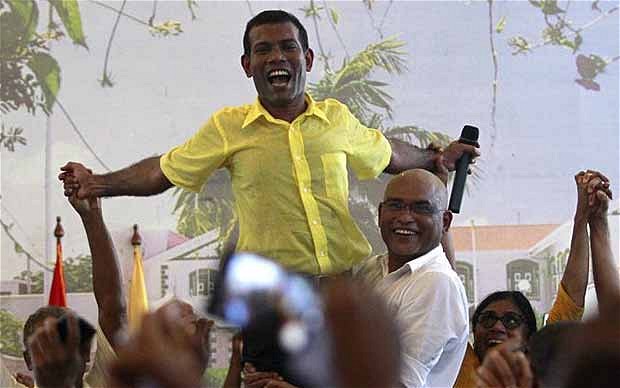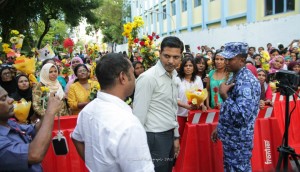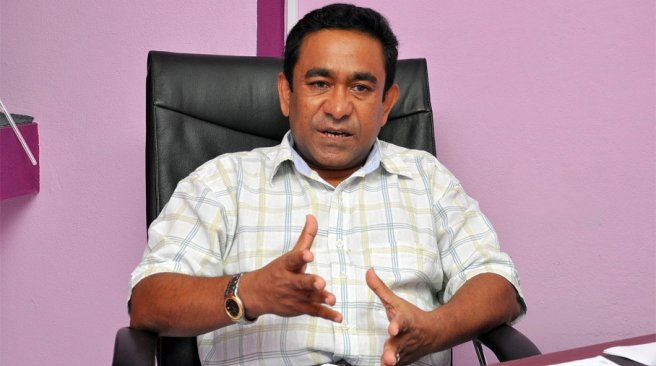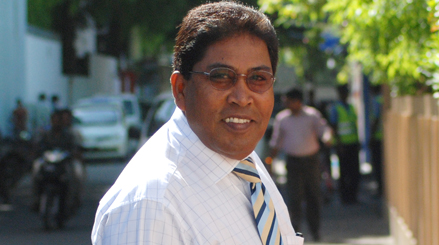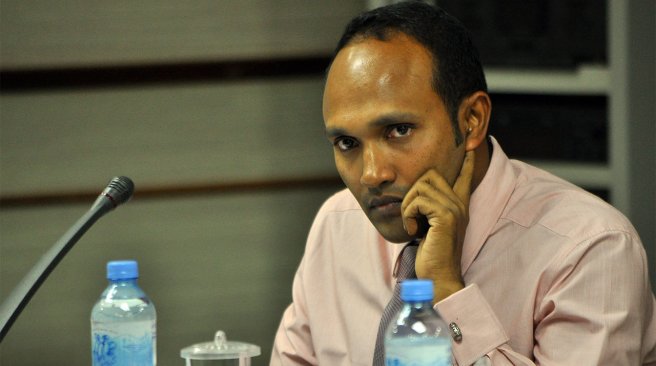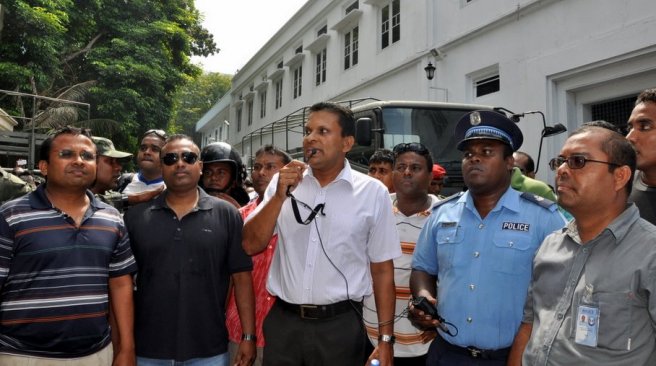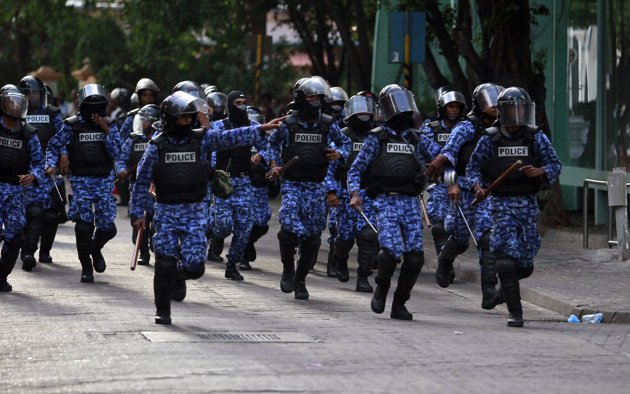This article first appeared on Dhivehi Sitee. Republished with permission.
Saturday dawned as crisp, sunny and beautiful as any other day in the Maldives. The clear blue skies belied the dark cloud that descended over a majority of the country’s population after the beleaguered Elections Commission announced shortly before midnight on Friday that the Supreme Court, and other allied state institutions, had left it with no choice but to call off the second round.
What the Elections Commission has been forced to call off is hope — the expectation that democracy will be restored in the Maldives on 11 November 2013.
For 19 long months, a majority of Maldivians have dedicated most of their lives to winning back democracy from the authoritarian gang that came to power on 7 February 2012. The fight has been all-consuming and has affected every single Maldivian one way or another.
In the immediate aftermath of the coup came the violent confrontations with the security forces. Hundreds were beaten up, arbitrarily arrested, detained without charge, and ordered to obey, or else. Basic human rights—freedom of assembly and expression—were rolled back. Foreign ties were broken coldly, with little care for international norms or the inevitable consequences. The economy suffered blow after blow, leading to bankruptcy with little hope for recovery in the foreseeable future.
Working with unscrupulous ‘religious scholars’, intense nationalism was promoted in parallel with virulent xenophobia against any foreign actor that promoted democracy. Ties with autocratic regimes were fostered, along with relations with international gangsters known for drug trafficking and money laundering. National assets were sold off and deals made with unscrupulous foreign governments that spoke democracy but acted with nothing but their own national interest in mind. Unexplained murders, gang-related crimes, drug abuse and sexual offences increased exponentially.
The international community’s decision to condone the coup and endorse it as ‘a legitimate transfer of power’ was a major blow, but not enough to kill the Maldivian people’s desire for democratic governance. In the face of intense pressure from the international community to obey, to put stability before rights, to follow ‘the democratic process’, combined with brutal force by domestic authorities, the street protests could not be sustained. But supporters of democracy did not give up. Led by Mohamed Nasheed and the Maldivian Democratic Party, Maldivians channeled their frustrated hopes into campaigning for a democratic election instead of protesting on the streets.
MDP’s presidential campaign has been an exemplary democratic exercise – the ‘costed and budgeted’ manifesto it brought out in August this year is the embodiment of a majority of Maldivians’ hopes and dreams for the future. It is based on views and opinions gathered from people on every inhabited island and it envisions a future in which the Maldivian people will, at long last, be empowered to work for their own socio-economic progress under a government that a majority of them have elected of their own free choice. Of course, it is naive to think that every desire would be fulfilled, but at least everyone was asked what they wanted, everyone had a say, and everyone could take ownership of their own future. No such bottom-up exercise has ever been conducted in the long authoritarian history of the Maldives.
On 7 September, 88 percent of the electorate turned out to vote. 45.45 percent of them voted for Mohamed Nasheed, 25.35 percent for Abdulla Yameen, 24.07 percent for Gasim Ibrahim, and 5.13 percent for Mohamed Waheed. Nasheed did not get the 50 percent plus one needed for an outright win, but the Maldivian map, from north to south, was all yellow at the end of voting that day. Most people in all atolls bar two want a democratic government led by Nasheed.
The authoritarians know this, always did. Plan B was there from the start – let them have their vote if they must, but the results will always be ours, as we want it. Over a thousand observers, local and foreign, verified the election as free and fair. Except for minor errors, expected in any election anywhere in the world, it went without a hitch. Only 25 percent of the Maldivian people want Maumoon Abdul Gayoom’s autocratic rule to continue. That’s when the stubborn septuagenarian called in all the stops and brought into full play the dregs of dictatorship that continued to infect Maldivian democracy throughout the three years or so it lasted.
Gayoom has played his old house-boy Gasim well. Taking full advantage of Gasim’s indignation about not having received the votes he paid for, Gayoom has dictated most of the Supreme Court bench – the most corrupt of the many corrupt state institutions – to rule in Gasim’s favour, bringing the Maldives to where it is today: a constitutional vacuum into which Gayoom can effortlessly step in and ‘rescue’ us from ourselves. If Gasim thinks that Gayoom will let him take the president’s oath on November 11, he is an even bigger fool than he has repeatedly shown himself to be.
The Supreme Court did not just issue an injunction against the second round, it also ordered the security forces to act against anyone who tries to go ahead with the polls. One can only imagine the elation of the baton-happy coup-Police Commissioner Abdulla Riyaz who immediately deployed his forces to the Elections Commission, sealing the Commissioner and staff off from interaction with anyone local or foreign.
Efforts for mediation by the international community were not just prevented by the police, but strongly criticised by Gayoom’s minions. With his daughter at the helm of foreign relations as the State Minister of Foreign Affairs, it summoned India’s High Commissioner for a good telling-off for attempting to help disenfranchised Maldivians. The government has not stopped spurning the international community since, and will not stop until it becomes clear to everybody – at long last – that Gayoom and his followers will not allow democracy in the Maldives, whatever it takes.
The truth of the matter is, and has been since 7 February 2012, is that there will be no election in the Maldives as long as Nasheed, the champion of the Maldivian democratic movement, is in the running. So the focus has now returned to the farcical prosecution of Nasheed, through the very courts that have proved again and again that they are neither independent nor respectful of the ‘judicial process’. The machinations are fully underway to annul the first round and put Nasheed behind bars before calling fresh elections, if there are to be any. Reports say Gayoom himself is planning to run if and when new elections are held, his ‘economist’ brother having failed to live up to family expectations by not being able to garner much support.
Having lived under Gayoom for most of their lives, a majority of Maldivians remain oblivious to the fact that indefinitely delaying the elections is a robbery of their fundamental right to vote, and not just that of MDP members or supporters of Nasheed. Their gloating about the cancellation of the election is both sad and sickening. They will do everything in their power to help bring Gayoom, and their own enslavement, back to life.
For the rest of Maldivians, the only choice left is to refuse to obey. Power, contrary to popular belief, is not something that can be taken away by force. It can only be given away, by the people, if we so decide.
Resisting a full-fledged authoritarian reversal has been a long hard slog that has taken a heavy emotional, financial and social toll on all of us. Sustaining the resistance will be difficult, and all out civil disobedience would be even harder; but do it we must, if we are to be in control of our own destiny. What we must keep in mind is: nobody can govern us without our consent. It is within our power not to give it.
Dr Azra Naseem has a PhD in International Relations
All comment pieces are the sole view of the author and do not reflect the editorial policy of Minivan News. If you would like to write an opinion piece, please send proposals to [email protected]
